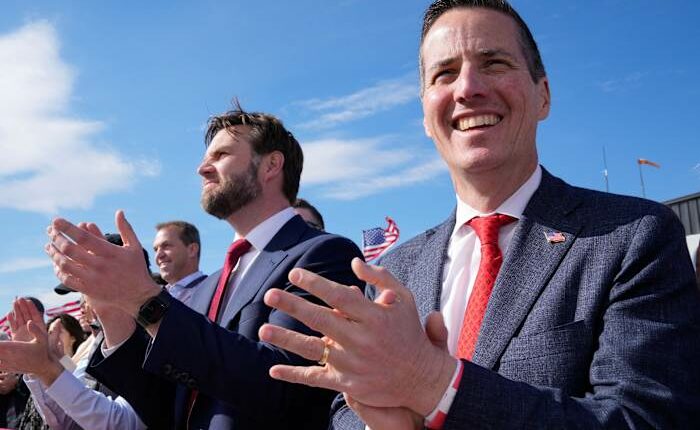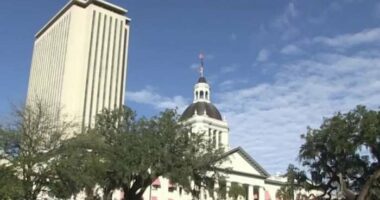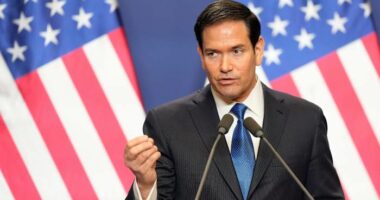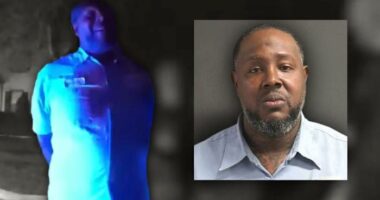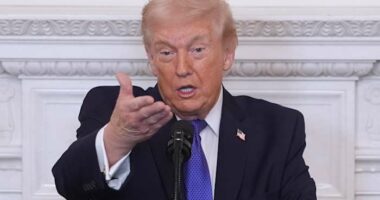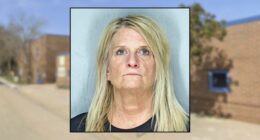Share this @internewscast.com

MIAMI – When Republican Sen. Bernie Moreno heads to Colombia this week as part of a tour through three nations in Latin America, it will be somewhat of a return to his roots.
As Ohio’s first Latino senator, Moreno was born in Bogota, the capital of Colombia. While he was pursuing the American dream in Ohio, he stayed connected to his country of origin through his older brothers, who are influential in Colombian politics and business.
In a conversation with The Associated Press before his trip, Moreno voiced significant worries about Colombia’s current path under the leadership of leftist President Gustavo Petro and mentioned that U.S. measures like sanctions, increased tariffs, or other actions could be necessary to correct its course.
Moreno described the recent criminal sentence against former President Alvaro Uribe, a conservative figurehead, as an effort to “silence” someone who rescued Colombia from insurgent violence. Concurrently, the surge in cocaine production has complicated U.S. security and risks Colombia losing its status with the White House for not sufficiently engaging in anti-drug initiatives.
“The goal of the trip is to grasp all complexities before any decisions are reached,” stated Moreno, who plans to meet with Petro, Uribe, business leaders, and local officials. “No options are off the table yet, and nothing specific is being decided right now.”
Elected with Trump’s support
Moreno, a luxury car dealer from Cleveland, won against incumbent Democrat Sherrod Brown last year, aided by Donald Trump’s backing and $441 million in political advertising—the largest amount spent in a U.S. Senate race ever.
He became Ohio’s senior senator on practically his first day in office after his close friend JD Vance resigned the Senate to become vice president. In Congress, he’s mimicked Trump’s rhetoric to attack top Senate Democrat Chuck Schumer as a “miserable old man out of a Dickens novel,” called on the Federal Reserve to cut interest rates and threatened to subpoena California officials over their response to anti-ICE protests in Los Angeles.
On Latin America, he’s been similarly outspoken, slamming Petro on social media as a “socialist dictator” and accusing Mexico of being on the path to becoming a “narco state.”
Such comments barely register in blue-collar Ohio, but they’ve garnered attention in Latin America, where Moreno has emerged as an interlocutor for conservatives in the region seeking favor with the Trump administration. That despite the fact he hasn’t lived in the region for decades, speaks Spanish with an American accent and doesn’t sit on the Senate Foreign Relations Committee.
“He’s somebody to watch,” said Michael Shifter, the former president of the Inter-American Dialogue in Washington. “He’s one of the most loyal Trump supporters in the senate and given his background in Latin America he could be influential on policy.”
Moreno, 58, starts his first congressional delegation to Latin America on Monday for two days of meetings in Mexico City with officials including President Claudia Sheinbaum. He’ll be accompanied by Terrance Cole, the head of the Drug Enforcement Administration, who is making his first overseas trip since being confirmed by the Senate last month to head the premier federal narcotics agency.
Seeking cooperation with Mexico on fentanyl
Moreno, in the pre-trip interview, said that Sheinbaum has done more to combat the flow of fentanyl into the U.S. than her predecessor and mentor Andrés Manuel López Obrador, who he described as a “total disaster.” But he said more cooperation is needed, and he’d like to see Mexico allow the DEA to participate in judicial wiretaps like it has for decades in Colombia and allow it to bring back a plane used in bilateral investigations that López Obrador grounded.
“The corruption becomes so pervasive, that if it’s left unchecked, it’s kind of like treating cancer,” said Moreno. “Mexico has to just come to the realization that it does not have the resources to completely wipe out the drug cartels. And it’s only going to be by asking the U.S. for help that we can actually accomplish that.”
Plans to tour the Panama Canal
From Mexico, Moreno heads to Panama, where he’ll tour the Panama Canal with Trump’s new ambassador to the country, Kevin Marino Cabrera.
In March, a Hong Kong-based conglomerate struck a deal that would’ve handed control of two ports on either end of the U.S.-built canal to American investment firm BlackRock Inc. The deal was heralded by Trump, who had threatened to take back the canal to curb Chinese influence.
However, the deal has since drawn scrutiny from antitrust authorities in Beijing and last month the seller said it was seeking to add a strategic partner from mainland China — reportedly state-owned shipping company Cosco — to the deal.
“Cosco you might as well say is the actual communist party,” said Moreno. “There’s no scenario in which Cosco can be part of the Panamanian ports.”
‘We want Colombia to be strong’
On the final leg of the tour in Colombia, Moreno will be joined by another Colombian American senator: Ruben Gallego, Democrat of Arizona. In contrast to Moreno, who was born into privilege and counts among his siblings a former ambassador to the U.S., Gallego and his three sisters were raised by an immigrant single mother on a secretary’s paycheck.
Despite their different upbringings, the two have made common cause in seeking to uphold the tradition of bilateral U.S. support for Colombia, for decades Washington’s staunchest ally in the region. It’s a task made harder by deepening polarization in both countries.
The recent sentencing of Uribe to 12 years of house arrest in a long-running witness tampering case has jolted the nation’s politics with nine months to go before decisive presidential elections. The former president is barred from running but remains a powerful leader, and Moreno said his absence from the campaign trail could alter the playing field.
He also worries that surging cocaine production could once again lead to a “narcotization” of a bilateral relationship that should be about trade, investment and mutual prosperity.
“We want Colombia to be strong, we want Colombia to be healthy, we want Colombia to be prosperous and secure, and I think the people of Colombia want the exact same thing,” he added. “So, the question is, how do we get there?”
___
Smyth reported from Columbus, Ohio.
Copyright 2025 The Associated Press. All rights reserved. This material may not be published, broadcast, rewritten or redistributed without permission.
